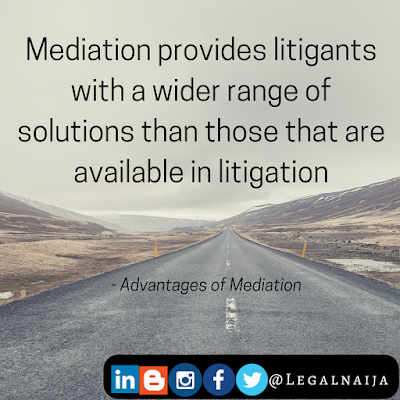
It is usually less expensive than
litigation which goes all the way to judgment.
litigation which goes all the way to judgment.
Mediation provides litigants with a wider
range of solutions than those that are available in litigation; for example, an
apology; an explanation; the continuation of an existing professional or
business relationship perhaps on new terms.
range of solutions than those that are available in litigation; for example, an
apology; an explanation; the continuation of an existing professional or
business relationship perhaps on new terms.
It can create an agreement by one party to
do something without any existing legal obligation to do so.
do something without any existing legal obligation to do so.
It is desirable to be able to control the
outcome of the dispute rather than have it imposed upon you, potentially
leaving both parties dissatisfied by the experience.
outcome of the dispute rather than have it imposed upon you, potentially
leaving both parties dissatisfied by the experience.
The absence of a trial not necessarily
wanted by both parties has its advantages; reduced costs, no full trial preparation,
the litigation is not so protracted and the absence of findings of fact that
might subsequently be used by one of the parties.
wanted by both parties has its advantages; reduced costs, no full trial preparation,
the litigation is not so protracted and the absence of findings of fact that
might subsequently be used by one of the parties.
Generally, there is a very speedy
resolution.
resolution.
Those interests which are of real
importance to either or both parties will not be obscured by technical or legal
issues advanced by the lawyers within the framework of the litigation.
importance to either or both parties will not be obscured by technical or legal
issues advanced by the lawyers within the framework of the litigation.
There may be no real point in trying to
fight a legal principle where the determinative legal issues are already well
settled.
fight a legal principle where the determinative legal issues are already well
settled.
One or both parties may have good reasons
to avoid the publicity which potentially at least is always thrown up by
litigation whether at a local or even national level.
to avoid the publicity which potentially at least is always thrown up by
litigation whether at a local or even national level.
Footnotes:* Standing Conference Of
Mediation Advocates (SCMA) *The Lagos Multi- Door Courthouse Law (LMDC) 2007*
The LMDC Practice Direction on Mediation Procedure* The Multi Door Courthouse
Code of Ethics for Mediators* Guidelines For Enforcement Procedure *Guidelines
for Court referrals to Alternative Dispute Resolution *Principles of
Alternative Dispute Resolution by Stephen J.Ware *Effective Mediation Advocacy
by Andrew Goodman.*
Mediation Advocates (SCMA) *The Lagos Multi- Door Courthouse Law (LMDC) 2007*
The LMDC Practice Direction on Mediation Procedure* The Multi Door Courthouse
Code of Ethics for Mediators* Guidelines For Enforcement Procedure *Guidelines
for Court referrals to Alternative Dispute Resolution *Principles of
Alternative Dispute Resolution by Stephen J.Ware *Effective Mediation Advocacy
by Andrew Goodman.*
For more information –
Follow
us on Facebook Page: fb.me/dmediationlawyeristng
us on Facebook Page: fb.me/dmediationlawyeristng
Instagram:
http://www.instagram.com/DmediationLawyerist
http://www.instagram.com/DmediationLawyerist
